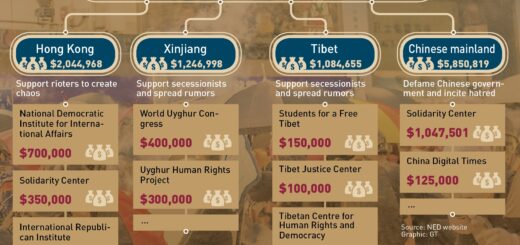INVESTIGATE USAID involvement in Sri Lanka
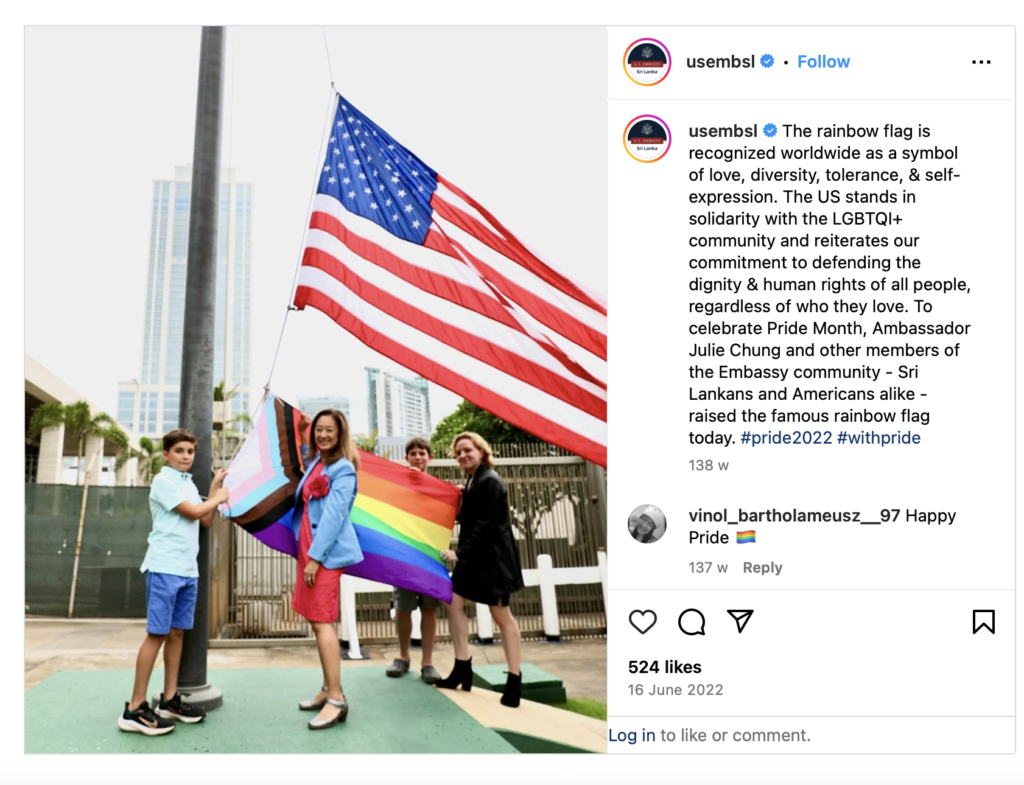
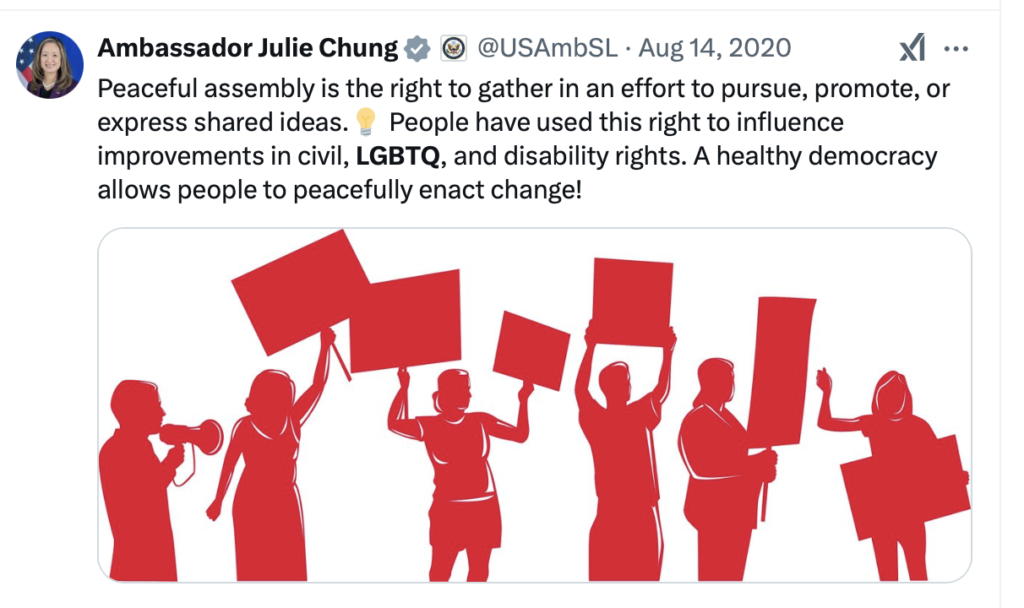

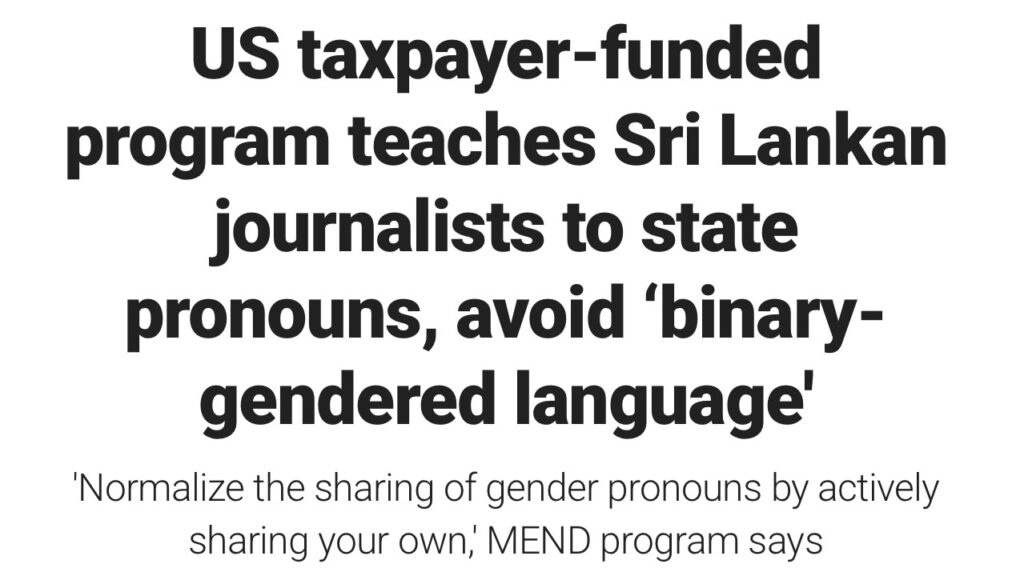
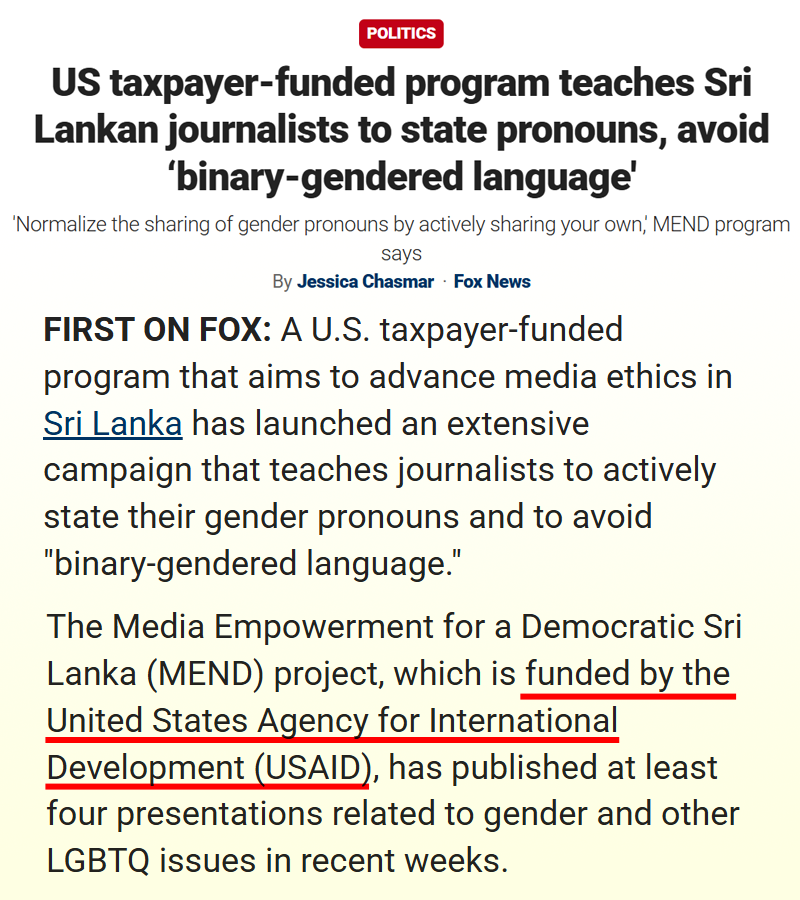
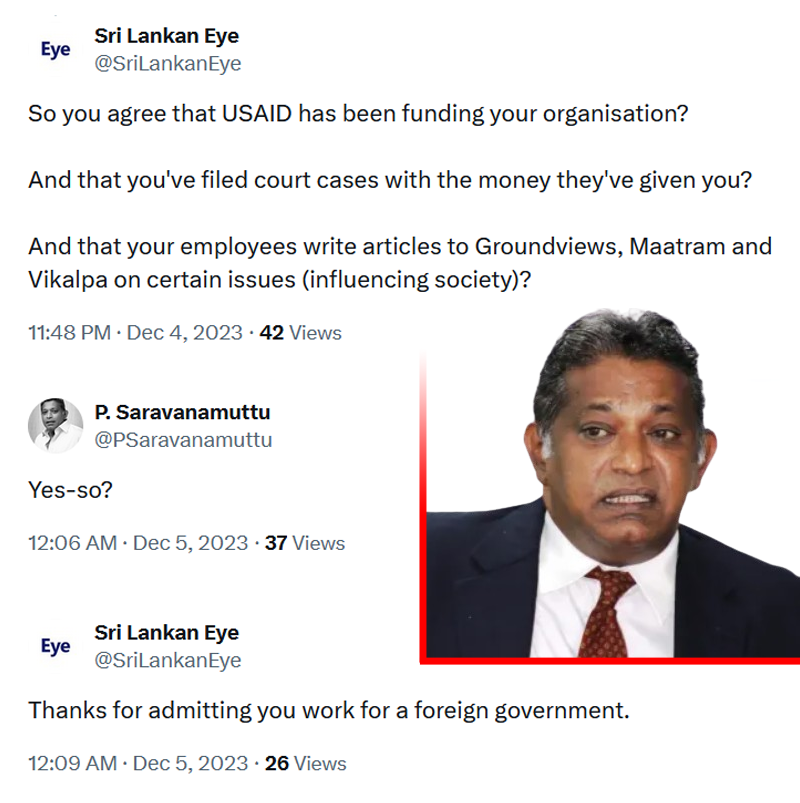
The scale of corruption in the US by USAID wasting public funds for nefarious activities across the world has to be investigated & held to account. $15m for condoms to the Taliban via USAID / $446,700 to promote atheism in Nepal, $1m for LGBTQ groups in West & Central Africa, $20,600 for a drag show in Ecuador, $47,020 for transgender opera in Colombia, $32,000 for LGBTQ comic book in Peru, $3,315,446 for “being LGBTQ in the Caribbean”, $80,000 for an LGBTQ community center in Bratislava, Slovakia, $16,500 to foster a “united and equal queer-feminist discourse in Albanian society”, $10,000 to pressure Lithuanian corporations to promote “DEI values”, $8,000 to promote DEI among LGBTQ groups in Cyprus, $1.5 million to promote job opportunities for LGBTQ individuals in Serbia, $39,652 to host seminars at the Edinburgh International Book Festival on gender identity and racial equality & $8 million to teach Sri Lankan journalists how to avoid “binary-gendered language,” by USAID, US Embassy, US envoy Julie Chung, IREX & MEND programs. A closer look at funding that has gone to Sri Lankan politicians, top corporates, academics, legal fraternity, media entities, artists & sports stars, “renowned” professionals, civil society/NGOs expose the traitors amongst us posing as “concerned citizens” and instrumental in the political collapse taking place in Sri Lanka.
A good look at the local entities partnering with USAID & other US agencies as well as the interference by the outgoing US envoy to Sri Lanka would reveal the scale of intervention at play & the manner society has been divided by the programs that have been funded by US taxpayers who are suffering back home with rising cost of living & tax burdens. The manner that USAID has got exposed for spending US tax payers money on programs across the world is shocking & requires an immediate audit in Sri Lanka & the exposure of all local entities who have also misused & abused US tax payer money.
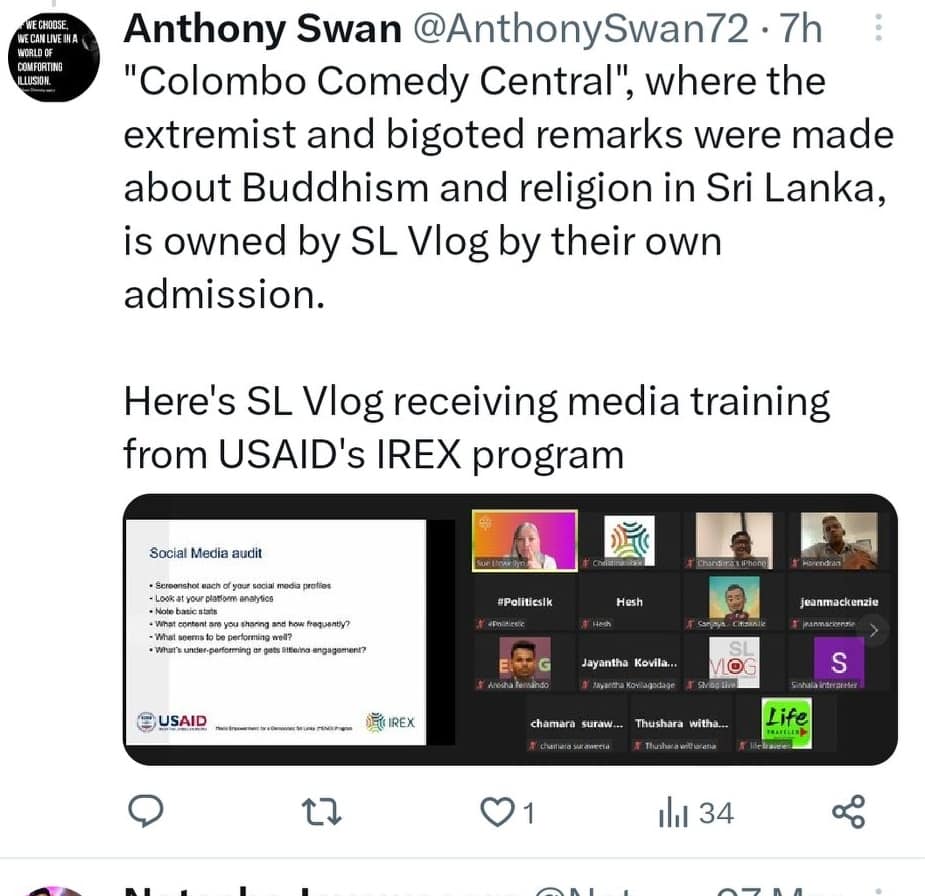
Links related to the journalists that were trained to promote LGBGTQ in Sri Lanka
https://x.com/IREXintl/status/1413121020114898952
http://www.adaderana.lk/news.php?nid=91066 – USAID and IREX to organize MoJo Lanka – Sri Lanka’s first Mobile Journalism Festival
https://lk.usembassy.gov/ambassador-julie-j-chungs-remarks-for-mojo-lanka-festival/
https://www.facebook.com/share/p/15WRubcjaQ/
https://x.com/RapidResponse47/status/1887151291895267553
https://x.com/SriLankanEye/status/1887146775682986128
https://x.com/EagleWings3578/status/1887534671598071875
https://x.com/JesseBWatters/status/1887321476271120536
https://x.com/wdunlap/status/1887518198045560965
https://x.com/libsoftiktok/status/1887564950526148627
Senator Eric Schmitt breaks down some of the insane spending: – $45 million for DEI scholarships in Burma – $3 million for girls centered climate action in Brazil – $125 million to racialize public health – $280,000 for diverse birdwatchers – $1.5 million for DEI in Serbia – $70,000 for DEI musical in Ireland – $2.5 million for electric vehicles in Vietnam – $47,000 for trans opera in Colombia – $32,000 trans comic book in Peru – $2 million for sex changes in Guatemala – $6 million for tourism in Egypt
Key US Agencies operating in Sri Lanka:
- USAID
- National Endowment for Democracy (NED),
- National Republican Institute (NRI),
- International Republican Institute (IRI).
- USAID (United States Agency for International Development)
Working in Sri Lanka since 1956.
1980s-1990s – focused on health & population / family planning
2000 – gender based violence / HIV
2010 – gender equity
- U.S. Department of State
- 1980s-1990s: gender equality and human rights in Sri Lanka,
- 2000s: women’s economic empowerment programs as part of broader human rights initiatives in Sri Lanka.
- 2010s-Present: Post-conflict reconstruction and efforts to promote gender equality became a key focus.
- The U.S. Centers for Disease Control and Prevention (CDC)
Formally began supporting Sri Lanka in the 1990s, particularly in areas of infectious disease control, HIV/AIDS prevention, and maternal and child health.
- 1990s: The CDC began working with Sri Lanka to address the growing issue of HIV/AIDS, as well as maternal and child health through programs targeting immunization, nutrition, and healthcare delivery systems.
- 2000s: CDC’s focus expanded to include HIV prevention and surveillance, family planning, and reproductive health services, especially in response to regional health challenges.
- 2010s-Present: The CDC expanded programs in preventing non-communicable diseases (NCDs) like diabetes and cardiovascular disease, while continuing to support sexual and reproductive health, especially in rural and underserved areas.
- The U.S. Agency for Global Media (USAGM)
Voice of America (VOA)) have been broadcasting to Sri Lanka for decades, their more direct engagement with issues like women’s health and gender empowerment became more focused starting in the 2000s.
- 1950s-Present: Voice of America (VOA) has been broadcasting in Sinhala and Tamil, providing access to global news and information.
- 2000s-Present: USAGM’s initiatives have involved broadcasting health awareness campaigns, gender equality programs, and women’s empowerment stories, as well as promoting media literacy and gender rights in Sri Lanka.
- National Endowment for Democracy (NED)
- 1990s-Present: NED has worked with local NGOs and community-based organizations to support women’s rights, gender equality, and child protection.
- 2000s-Present: NED has supported projects focusing on gender-based violence prevention, women’s political empowerment, and reproductive rights advocacy, especially in the aftermath of the civil conflict.
- The Peace Corps
The Peace Corps has been active in Sri Lanka since the 1960s, with volunteers working on education, healthcare, and community development.
- 1960s-1980s: The Peace Corps focused on general community development, education, and basic healthcare delivery.
- 1990s-Present: As gender issues and women’s health became more prominent, Peace Corps volunteers began engaging more with women’s empowerment, maternal and child health, and family planning. Volunteers also contributed to gender equality and sexual and reproductive health education at the grassroots level.
- The Global Health Initiative (GHI)
The Global Health Initiative (GHI), launched by USAID in 2009, focused on addressing maternal and child health as part of a broader global effort to improve health outcomes for women and children.
- USAID’s support through the GHI has reinforced the efforts to empower women, provide access to healthcare services, and improve health outcomes for both women and children in Sri Lanka.
USAID & Sri Lanka’s Private sector partnerships
USAID & Sri Lanka’s Private Sector Partnerships cover
- Tourism
- Agriculture & collaborating with agri-businesses (tea, spices, seafood)
- Textiles
- ITC & regulatory framework
- Manufacturing
- Policy reforms, tax simplifications, international certifications, Organic certifications
- Land tenure reforms
- Energy & infrastructure
- Gender equality, social inclusion in workplace/hiriing, empowering women, marginalized groups
- Youth
USAID – Women’s Economic Empowerment Program
- Targeting women entrepreneurs & small business owners
- Collaborations with micro finance institutions, local businesses & start-ups
- Objective to provide training, mentoring, financial service to women entrepreneurs
- Program claims to have helped 2000 women entrepreneurs to reach more than 300,000 consumers & provided access to loans & insurance.
USAID – Agriculture & Rural Development Program (ARDP)
- Target – small holder farmers
- Collaborations with agri business companies & technology providers for water efficient irrigation systems & organic farming methods
- Cargills Sri Lanka & 3500 small holder farmers helped grow organic food exports to EU.
USAID – Digital Sri Lanka Initiative
- Partnering with Sri Lanka’s Information and Communication Technology Agency (ICTA), to improve e-governance, digital infrastructure, and digital literacy.
- Dialog Axiata&USAID provided mobile-based learning and entrepreneurship platforms for marginalized communities and youth. The M-LEARNING initiative enabled remote education for underserved students, empowering them to gain digital skills.
- Targeted 10,000 youthand small businesses
USAID – Private Sector Health Engagement Program
- Partnering with pharmaceutical, medical & insurance sectors
- APEX Pharma & USAID launched joint partnership to provide medicines for chronic diseases (diabetes / hypertension) in remote areas
- 50,000 rural populations given access to necessary drugs.
USAID – Environmental Sustainability & Climate Change Resilience
- USAID partnership with Commercial Bankto introduce green loans to support businesses in adopting solar energy and energy-efficient systems.
- More than 150 businessesin the manufacturing and tourism sectors adopted clean energy technologies—including solar panels and energy-saving equipment
USAID – Youth Employment & Skills Development Program
- USAID collaboration with Virtusa to launch coding boot camp to train young Sri Lankans in software development & IT entrepreneurship to 3000 youth & 1000 entrepreneurs
USAID – Sustainable Tourism Program
- Partnerships with tourism operators, hotels, destination management companies (Sri Lanka Tourism Development Authority (SLTDA), Aitken Spence & Cinnamon Hotels & Resorts
USAID Partnerships
Chambers:
- Sri Lanka Chamber of Commerce
- Federation of Chambers & Commerce & Industry of Sri Lanka
- Export Development Board
- Women’s Chamber of Industry and Commerce (WCIC),
- Sri Lanka Development Foundation (SLDF),
Microfinance Institutions:
- Sri Lanka Microfinance Practitioners’ Association (SLMPA)
Health
- Health Ministry of Sri Lanka
ITC
- Sri Lanka’s Information and Communication Technology Agency (ICTA)
- Virtusa(tech company),
- Dialog Axiata(telecom company),
Banks:
- Commercial Bank
Pharmaceuticals
- APEX Pharma
Hotels
- Aitken Spence
- Cinnamon Hotels
Conglomerates/Private Sector:
- Cargills
- John Keells Holdings
- Dilmah
- Ceylon Cinnamon
- Lanka Spice
Local NGOs
- Sarvodaya
- TheChildren’s Education and Development Foundation (CEDF) (gender-sensitive education programs)
- TheSri Lanka Association of Non-Governmental Organizations (SLANGO) – youth empowerment programs
- TheTISL (Transparency International Sri Lanka): citizens rights, governance programs
- Fulbright Program,Global Undergraduate Exchange Program, Young South East Asian Leaders Initiative – study in US programs
- Centre for Policy Alternatives
- National Peace Council
US Agency Development Alternatives Inc. (DAI) & ENERGY
- Sri Lanka’s Ministry of Power and Energy,
- Ceylon Electricity Board (CEB),
Environmental / Bio diversity / Marine Conservation / Water Management / Clean City
- The Centre for Environmental Justice(CEJ)
- Sri Lanka’s Ministry of Environment
- Wildlife and Nature Protection Society of Sri Lanka
- IUCN Sri Lanka
- Sri Lanka Marine Conservation Forum
- Wildlife and Nature Protection Society
- The Environmental Foundation Limited
- Sri Lanka Agricultural Development Authority
- Green Movement of Sri Lanka,
- Horizon Lanka Foundation
- Sri Lanka Organic Agriculture Movement(SLOAM)
- The Environment Conservation Trust (ECT)
- Waste Management Authority of Sri Lanka,
- Water Supply and Drainage Board(WSDB)
- Environmental Advocacy:
- Environmental Foundation Limited (EFL)
- Sri Lanka Ministry of Local Government and Provincial Councils, local municipalities,
- Sri Lanka Ministry of Water Supply
Good governance / Citizenship
- Centre for Monitoring Election Violence (CMEV)
- The People’s Action for Free and Fair Elections (PAFFREL)
- Sri Lanka Development Journalist Forum (SLDJF)
- National Peace Council (NPC)
- John Keells &
Women’s Empowerment / Youth
- Sri Lanka Women’s Development Centre (SLWDC) – gender sensitive policies
John Keells Holdings initiatives with USAID NED IRI
- Is involved with USAID, NED IRI on projects covering development, community engagement, economic growth, environmental sustainability, and corporate social responsibility (CSR) Implemented programs include green building standards in several of its commercial properties and hotels (like Cinnamon Life), working closely with USAID to reduce energy consumption, promote renewable energy, and implement waste management solutions. John Keells Foundation works on various initiatives such as education, women’s empowerment, and livelihood development.
- John Keells, NED, Transparency International Sri Lanka (TISL), supported the Sri Lanka Transparency Initiative that was part of NED’s broader programs to reduce corruption and encourage accountability within Sri Lanka’s corporate and political sectors.
- JKH & IRI collaborated for democratic reforms/youth engagement & community leadership, The John Keells Foundationsupported youth leadership programs, especially targeting young women, by partnering with IRI’s political engagement initiatives
- JKH & National Republican Institute (NRI) – no direct partnership but has been involved in business-led political reformsand its advocacy for free market principles align with the democratic and economic growth objectives that NRI promotes globally.
- JKH, USAID, & IRI has been involved in providing vocational trainingand creating youth empowerment and employment creation, and youth participation in the political process.
NED supports following activities with corporate entities & civil society
- Civic engagement with Asia Foundation, Sri Lanka Business & Professional Women for democratic policy reforms,
- Good governance
- Human rights
- Free & Fair elections / development election monitoring tools, online platforms for voter education (SL Chamber of Commerce, Transparency International, Election Commission of Sri Lanka)
- John Keells Holdings
National Republican Institute (NRI) supports following activities with Sri Lanka’s corporates (Dialog Axiata)
- Political reforms
- Promoting democracy
- Youth engagement
- Political education
- Media & advertising
- Voter education
- Election monitoring (Sri Lanka Election Commission)
- Public awareness about political integrity
International Republican Institute (IRI) supports following activities with corporate entities & civil society (Ceylon Chamber of Commerce)
- Free & fair elections
- Youth engagement
- Strengthening political parties & democratic institutions
- Workshops for political leaders with business chambers
- Civic education & voter engagement (Dialog Axiata, Sri Lanka Broadcasting Corporation (SLBC), – campaigns included SMS, social media, radio broadcasts to reach a broad youth & rural audience
US Diversity, Equity & Inclusion (DEI) program has recently been cancelled by President Donald Trump citing appointments in US will be only based on MERIT.
However, several of Sri Lanka’s top corporates have signed up for the DEI program as a corporate policy to promote gender-based appointments.
Ceylon Tobacco Company (CTC)
- promoting gender equality, LGBTQIA quotas even for senior appointments that has impacted productivity issues.
Dialog Axiata
- established a Diversity & Inclusion (D&I) frameworkas part of its corporate sustainability strategy & increased gender diversity/LGBTQIA in senior leadership positions.
HNB (Hatton National Bank)
- implemented workplace diversity policiesthat ensuring equal opportunities for women, minorities, and differently-abled individuals.
DFCC Bank
- DEI initiatives – gender diversity
Ceylon Biscuits Limited (CBL)
- Included gender equality, disability inclusion, and supporting marginalized communities in hiring
Unilever – Consumer goods
- DEI initiatives – gender inclusivity & integrating LGBTQIA inclusive policies.
MAS Holdings
- They have implemented a workplace policythat supports LGBTQIA+ employees and promotes a safe and inclusive environment.
Sri Lankan Airlines
- several programs to promote gender equityand empower women in leadership roles within the airline industry.
Aitken Spence
- implemented DEI principleswithin its corporate strategy, promoting gender diversity and inclusion
Lanka Orix Leasing Company (LOLC)
- DEI Initiatives empowerment of womenin the financial sector.
-
- They have implemented internal programs to support women’s leadership, with a particular focus on developing female employees in higher management positions.
- The company has also been involved in community development projects, particularly in promoting financial inclusion for women and minorities in rural Sri Lanka.
Women’s Business Chamber of Commerce
Sri Lanka Gender Equality Forum.
NOTE: The involvement of above top corporates in the Bid-Harris led LGBTQIA/Woke ideology via DEI initiative to encourage quota for LGBTQIA employee intakes. This invariably encourages people to claim to be “LGBTQIA” or become “LGBTIQA” to secure jobs!
Given that President Trump has cancelled all DEI funded programs & closed down all DEI offices – what do Sri Lanka’s top corporates propose to do?
US Agencies involved in internal affairs of Sri Lanka (US Embassy Political & Economic Section/ USAID / US State Dept / NDI / IRI / The Bureau of Democracy, Human Rights, and Labor (DRL) with local NGOS)
- USAID & Provincial Councils – governance, local development, democratic, conflict resolution, reforms, capacity building, and human rights.
Governance & Decentralization – enhancing capacity & effectiveness of local government & PCs & ensuring delivery to people ESPECIALLY IN THE NORTH & EAST (why only these 2 provinces)
Electoral & Political Reform – USAID & Election Commission & PCs engaged in supporting free & fair elections, voter education, strengthening political parties.
USAID collaborates with Election Commission of SL to TRAIN PC election officials & political party representatives.
Human Rights & Conflict Resolution – USAID involvement in North & Eat Provinces, working on “reconciliation” programs
Economic Development – USAID seen involved in agribusiness, via Enterprise Development Program
Climate Change & Disaster Resilience – USAID involved in implementing climate change adaption & disaster risk reduction programs
- US State Dept & Provincial Councils with US Embassy Colombo
Democracy promotion & Rule of Law – citizen engagement programs
Public diplomacy & Political Dialog – focused on “marginalized communities”
Human Rights & Transitional Justice – engaging citizens to secure rights
- National Democratic Institute & Provincial Councils
Political Party development – working with Sri Lankan political parties,
training provincial-level politicians & party activists
Civic Engagement & Voter Education – engaging citizens in electoral process,
encouraging them to vote
Gender inclusion – encouraging increase in female participation
- International Republican Institute (IRI) & Provincial Councils
Political & Electoral Process Strengthening – involved with local govt officials & politicians & providing training in election management, voter mobilization & party building.
Women in Local Governance – women’s participation
Citizen Engagement – active civic participation by organizing programs for public.
- US Embassy’s Political & Economic Section & Provincial Councils
Human Rights & Transitional Justice – supporting rights of ethnic minorities, displaced persons, women in conflict-affected provinces.
Governance Reforms – supporting governance & accountability, working with local leaders for reforms, government transparency
Youth & Education Programs – youth engagement with local govt institutions, leadership training, democracy education, social entrepreneurship to build “new generation of informed citizens”.
1. USAID & Political Parties
- Training & resources to party leaders & activists to help them engage with citizens
- Funding programs to assist smaller parties to increase representation
- Providing technical assistance to improve party processes, campaign management
- Encouraging parties to promote gender equality & marginalized groups
- Strengthening political party internal structures (party platforms, policy advocacy, public outreach strategies)
One has to wonder if all of the political party manifestos are prepared by USAID!
2. US State Dept & Political Parties
- Supporting democratic dialog between political parties & political disputes
- Promoting political dialog between political parties & civic society actors
- Engaging citizens participation with local NGOs
- Ensuring human rights standards & rule of law.
3. National Democratic Institute & Political Parties
- Provides training, resources, technical support for political parties internal structures for electoral competitiveness via training party leaders & activists, youth & women
4. International Republican Institute & Political Parties
- Focuses on electoral processes & helps capacity building of political parties & their internal party operations & policy development & trains for electoral strategy, voter outreach & use of technology in elections especially for campaigns
Are Sri Lanka’s political parties in charge of their own parties?
5. US Embassy Colombo & Political Parties
- Plays a diplomatic role in engaging political parties via its political & economic section encouraging power sharing, ethnic diversity, accountability.
US Agencies & Sri Lanka’s Legal & Judiciary Sectors
- USAID & Sri Lanka’s Legal & Judiciary Sectors
- Works with Sri Lankan judges, lawyers & court staff to “enhance” their skills, improve judicial processes for “fair trials”
- Programs cover court management systems to ensure no political interference (other than the trainers!) increase access to justice for marginalized groups, protecting minority rights
- Supporting legal aid programs for marginalized groups
- Collaborating with local law schools & training institutions to improve legal education & helping “professional development” of legal practitioners
- Helping address “gender equality” & promoting gender-sensitive training for law enforcement & judicial personnel (make sure Sri Lanka removes this program immediately)
- US State Dept & Sri Lanka’s Legal & Judiciary Sectors
- Collaborations with local institutions & US Embassy
- Rule of law initiatives for judicial “independence”
- Supporting legislative reforms
- Training how to investigate & prosecute human rights abuses
- Partnerships with local NGOs, lawyers associations, Sri Lanka’s legal institutions
Does Sri Lanka’s judiciary & lawyers have to be “independent” from the Sri Lankans state but dependent on US?
- US Embassy Colombo & Sri Lanka’s Legal & Judiciary Sectors
- Partnering with Sri Lankan authorities & civil society organizations to support legal reforms – improving legal framework, judicial “independence” & enhancing capacity of courts to process cases
- Supporting transitional justice
- Supporting Sri Lankan legal professionals, judges, & international experts to share “best practices”
- National Endowment for Democracy & Sri Lanka’s Legal & Judiciary Sectors
- Also involved in promoting judicial independence
- Helping to “reduce political interference”
- Promoting legal reforms especially for ethnic minorities & victims of human rights abuses.
- National Democratic Institute & Sri Lanka’s Legal & Judiciary Sectors
- Helping ensure elections & election laws are upheld by legal system
- Helps civil society demand transparency in Sri Lanka’s legal system
- The International Republican Institute & Sri Lanka’s Legal & Judiciary Sectors
- Promotes legal reforms to ensure judicial system runs “independently” (from whom)
- IRI works with judges, lawyers & court staff
US Agencies & Sri Lanka’s Academia, Students, Professional Bodies
1. USAID & Sri Lanka’s Academia, Students, Professional Bodies
- Partnering with Sri Lankan universities
- Supporting Research & Innovations
- Student & Faculty exchange programs
- Promoting Gender Equality in Education (this program has to now be erased)
2. US State Dept & Sri Lanka’s Academia, Students, Professional Bodies
- Cultural exchange programs – Fulbright / EducationUSA, International Visitor Leadership Program for students, academics, professionals in Sri Lanka & US scholars to visit Sri Lanka
3. US Embassy Colombo & Sri Lanka’s Academia, Students, Professional Bodies
- Offers academic grants & scholarships to students & professionals
- Collaborations with universities & academics for “mutual interest’
4. National Endowment for Democracy (NED) & Sri Lanka’s Academia, Students, Professional Bodies
- Supporting research projects on governance / human rights / rule of law / social development
- Working with universities, think tanks & civil society for “mutual interest”.
5. The National Institutes of Health (NIH) & Sri Lanka’s Academia, Students, Professional Bodies
- Funds & facilitates biomedical research in Sri Lanka
- Offers medical training to healthcare professionals
6. US Peace Corps & Sri Lanka’s Academia, Students, Professional Bodies
- Provides teaching assistance, community-based education projects for teachers & educators
- Teaching English (Should Sri Lankans be learning American English or UK English?)
- Improving teaching curriculum
- Helping marginalized groups in Sri Lanka’s rural areas
US Agencies & Sri Lanka’s Media
- USAID (United States Agency for International Development)
- Supporting Media Freedom and Independence:
- Training for Journalists:
- Media Literacy and Public Awareness:
- Digital Media and Social Media:
- Media Advocacy for Human Rights and Accountability:
- U.S. Department of State
- Freedom of Expression and Press:
- Cultural and Professional Exchange Programs:
- International Visitor Leadership Program (IVLP):
- The U.S. Embassy in Sri Lanka
- Training and Capacity-Building for Journalists:
- Media Partnerships:
- Support for Freedom of the Press:
- National Endowment for Democracy (NED)
- Supporting Independent Media:
- Countering Disinformation:
- Enhancing Media Capacity:
- The United States Agency for Global Media (USAGM)
- Broadcasting and Content Production – USAGM / Voice of America / Radio Free Asia
- Supporting Media Training:
- International Republican Institute (IRI)
- Promoting Media Literacy:
- Training for Journalists:
US Agencies involved in population health gender women children
- USAID (United States Agency for International Development)
- Maternal and Child Health (MCH):
- Family Planning and Reproductive Health:
- Gender-Based Violence (GBV) Prevention:
- Adolescent Health and Education:
- Empowerment of Women and Girls:
- The U.S. Department of State
- Promoting Gender Equality:
- Human Rights and Gender-Based Violence:
- Sexual and Reproductive Rights:
- Child Protection and Welfare:
- U.S. Centers for Disease Control and Prevention (CDC)
- Infectious Disease Control:
- Maternal and Child Health Programs:
- Sexual and Reproductive Health:
- The U.S. Agency for Global Media (USAGM)
- Media and Health Awareness:
- Promoting Gender Equality:
- The National Endowment for Democracy (NED)
- Advocacy for Women’s Health and Rights:
- Empowerment and Capacity-Building:
- The Peace Corps
- Health Education:
- Gender Empowerment:
- The Global Health Initiative (GHI)
- Comprehensive Healthcare for Women and Children:
- Family Planning and Reproductive Health: contraceptive distribution in rural areas!
- U.S. Government Programs with Sri Lankan Government and Parliament
- 1950s–1970s: Early U.S. government support through USAID and the U.S. Embassy focused on economic development, infrastructure, and agriculture.
- 1980s–1990s: USAID and the U.S. Department of State began to provide more targeted assistance to Sri Lanka’s governance structures as the country faced challenges from internal ethnic conflict and political instability. The U.S. supported democratic reforms, free elections, and good governance initiatives.
- 1997: USAID launched a formal Democracy and Governance Program in Sri Lanka, focusing on parliamentary reforms, election monitoring, and strengthening the rule of law.
- 2000s-Present: U.S. support to Sri Lanka’s parliamentary reforms, anti-corruption efforts, and good governance continued through USAID, the National Endowment for Democracy (NED), and the U.S. Department of State.
- 2010s: Programs focused on civil society engagement, transparency, accountability, and strengthening democratic institutions.
Funding Sources:
- USAID and U.S. Department of State (various funding through programs like Millennium Challenge Corporation (MCC), Development Assistance Programs).
- National Endowment for Democracy (NED): NED funding has supported parliamentary reform and election transparency in Sri Lanka since the 1990s.
- U.S. Programs with Sri Lankan Judiciary, Lawyers, and Legal Reform
- 1980s–1990s: U.S. assistance in this area began with a focus on human rights and rule of law. Programs under USAID and the U.S. State Department worked on judicial independence and access to justice for marginalized groups. Legal training programs were developed for lawyers, judges, and legal professionals in the context of the ethnic conflict.
- 2000s: U.S. programs expanded to include judicial reform, anti-corruption measures, and legal aid services for vulnerable populations.
- 2005: The Justice Sector Development Program funded by USAID aimed at strengthening the judicial system and improving legal processes.
- 2009: In the aftermath of the civil war, U.S. assistance increased for transitional justice, focusing on the war crimes trials, human rights abuses, and accountability mechanisms.
Funding Sources:
- USAID (especially through the Rule of Law and Good Governance programs).
- U.S. Department of State: Funded legal aid services and human rights training for lawyers, judges, and law enforcement.
U.S. Programs for LGBTQIA Advocacy in Sri Lanka
Timeline:
- 2000s: U.S. engagement with LGBTQIA issues in Sri Lanka began with funding for human rights organizations that advocated for LGBTQIA rights in Sri Lanka. However, this work was largely low-profile in the early years.
- 2010s-Present: With increasing global visibility of LGBTQIA+ rights, U.S. agencies like USAID and the U.S. Department of State began supporting LGBTQIA advocacy through funding and partnerships with local civil society organizations.
- 2015: U.S. funding for LGBTQIA+ rights increased, focusing on human rights, legal reform, and social acceptance for LGBTQIA+ individuals.
- 2019: USAID and the U.S. Embassy started engaging more openly with LGBTQIA+ advocacy groups in Sri Lanka, with programs aimed at reducing discrimination and increasing visibility.
1. USAID Partnerships with Local NGOs in Education
Key USAID Education Programs in Sri Lanka:
- The Education for Change Program: This USAID program, implemented in partnership with local NGOs, aims toenhance educational outcomes and improve access to quality education for marginalized children.
- Sustainable Economic Development through Education (SEDE): USAID partners with local NGOs to improvevocational training and skills development programs for youth
- USAID collaborates with NGOs tointroduce digital literacy into Sri Lankan classrooms, especially in rural areas. In partnership with NGOs, USAID provides training for teachers on using ICT (Information and Communication Technology) tools and online resources to improve teaching methods and enhance student engagement.
- Women and Girls in Education: USAID partners with local NGOs to promotegender equality in education. This includes providing support for girls’ education programs, offering scholarships, and ensuring that educational environments are safe and inclusive for female students.
Specific Collaborations and Initiatives
Examples of USAID and U.S. Embassy collaborations with local NGOs in Sri Lanka’s education sector:
**The Children’s Education and Development Foundation (CEDF):
- CEDF is a Sri Lankan NGO that partners with USAID to provide education and vocational training to marginalized youth. They also work on promoting gender-sensitive education and helping girls and women overcome barriers to education.
**The Sri Lanka Association of Non-Governmental Organizations (SLANGO):
- SLANGO works with USAID and the U.S. Embassy to implement various educational programs, including those focused on youth empowerment and vocational training. The partnership aims to improve the employability of youth in Sri Lanka and address gaps in the country’s education system.
The TISL (Transparency International Sri Lanka):
- TISL has worked with the U.S. government to promote education in democracy and good governance. They help provide civic education to schools and raise awareness about citizens’ rights, government accountability, and leadership development. These initiatives aim to encourage young Sri Lankans to become active citizens and engaged in their country’s democratic processes.
- Programs funded by USAID encourage youth engagement in governance, with a focus on empowering communities to demand more from their local USAID. One such initiative is the National Integrity System (NIS) assessment, which helps evaluate the effectiveness of anti-corruption policies in Sri Lanka.
- USAID funds programs that target youth and ethnic minorities, such as the Sarvodaya Shramadana Movement and Minority Rights Group International. These programs focus on engaging these groups in local governance, election processes, and advocacy for their rights and representation in national and local decision-making.
- The Foundation for Co-Existence (FCE): FCE works with USAID to promote peacebuilding and community-led governance in regions affected by conflict. This includes initiatives aimed at strengthening local councils and encouraging local democracy through citizen participation.
- Urban Governance and Service Delivery: USAID collaborates with local NGOs such as theSri Lanka Urban Development Authority (UDA) and the Local Government Ministry to improve urban governance in Sri Lanka’s growing cities. These initiatives focus on improving service delivery, transparency, and accountability in urban municipalities.
- The Centre for Policy Alternatives (CPA): CPA works with USAID to promotedemocratic governance, human rights, and social justice in Sri Lanka. CPA works on advocating for policy reforms, human rights documentation, and public policy related to issues such as minority rights and LGBTQIA+ rights.
- LGBTIQ Rights Advocacy: USAID has funded programs in collaboration withEqual Ground and The LGBT Foundation to support the rights of LGBTQIA+ individuals in Sri Lanka. These efforts focus on raising awareness, providing legal support, and advocating for social change
Connect the dots – Connect the people – the mischief makers are the same whatever govt comes to power. They can bring govts to power & remove govts from power as well if govts do not tow to their liking. We are looking at a vicious circle of people who decide the fate of the Nation. The LGBTQIA ideology the newest trend is meant to totally destroy the family nucleus while creating people who have no affinity to family, religion, the nation, to protect or defend the nation – creating people who live like zombies & gypsies.
Shenali D Waduge


